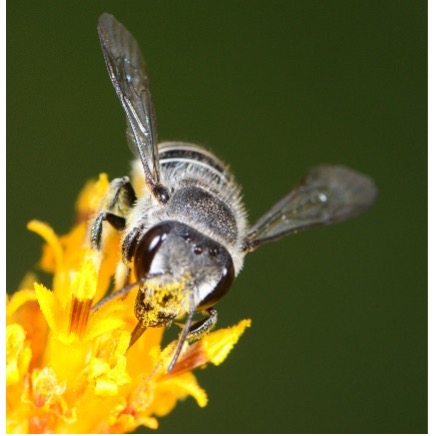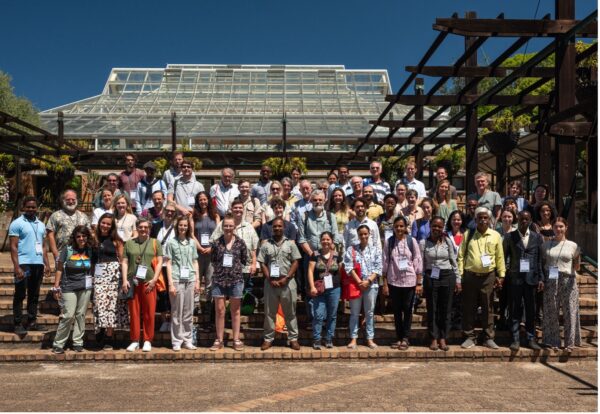The Launch of Big Bees of South Africa : a Photographic Guide
North-West University (2022)
Building Bee Taxonomic Capacity Among Citizen Scientists in South Africa
Project Details
Project News
Last Updated: January 9th, 2025
Background
Dr Eardley and his team will monitor bees and collect biodiversity data to help determine the conservation status of bees in South Africa. In addition to data collection, the project seeks to foster a local awareness of bee biodiversity and the integral connection with plants and plant biodiversity.
With over 1,000 bee species native to South Africa, the Building Bee Taxonomic Capacity among Citizen Scientists in South Africa project will engage a growing and dedicated group of local citizen scientists, students and academics to assist in identification and collection. Materials and training will be created to enable correct identification of bees at family, genus and species levels (all families, most genera and selected species).
Photos: Dino Martins
iNaturalist: https://www.inaturalist.org/projects/bees-of-south-and-southern-africa
Project Details
The main activities are:
1. Training 20 para-taxonomists in solitary bee identification (Biannual bee identification courses in Johannesburg/Pretoria and Cape Town, over three years (six courses in each city).
2. Publishing material for bee identification (Three field guides to encourage bee monitoring, species documentation, and unique plant associations)
3. Encouraging the monitoring bees to determine their conservation status
4. Creating awareness of bee biodiversity
5. Training through hosting a special session that’ll be of interest to citizen scientists at the Twelfth International Symposium on Pollination, in Cape Town, 2023
Grant Related News
JRS highlight Growing Citizen Science and Bee Watching in South Africa
Update from Project Director Connal Eardley :The bee of the week. The Green Economy (https://greeneconomy.media/) in embracing awareness of bee diversity and their importance for plant diversity will feature a bee of the week. There is an amazing diversity of bees in South Africa, of which only one species is the honeybee – more than 1 000 other species are solitary pollinators. Each bee of the week will be in one of the guides to the bees of South Africa, in preparation, as part of a JRS/ NWU (North West University) project. The pictures of the bee of the week, and in the guides, were taken under a microscope to show important detail. You should photograph bees on flowers, or elsewhere in natural setting, identify them from the guides and post the pictures on iNaturalist (https://www.inaturalist.org/projects/bees-of-south-and-southern-africa?tab=observations) such as the one below.

Update from Project Director Connal Eardley: Eager to get going the bee group in Gauteng, South Africa, had a course on bee identification at the University of Witwatersrand, Johannesburg. It was held on Saturday 3rd September 2023 and was attended by ten learners. Being a citizen scientist project courses are held on Saturdays because most people work during the week. Although one day is very short, bee identification needs to be learned is small bites. And learning to use the materials is most important. The first course was to be a practice round to see what works and to learn from our mistakes. Nevertheless, it had a surprisingly good turnout. The group comprised many of the leaders in citizen scientist bee biodiversity conservation, which made lunchtime a brainstorming session on how to widen the scope of our project. After the Twelfth International Symposium on Pollination, at Kirstenbosch National Botanic Gardens, three more formal training courses will take place in Cape Town, Durban and Johannesburg.

Update from the Project Director: The Twelfth International Symposium on Pollination (ISPXII) was held during 16-20 October 2023 at Kirstenbosch National Botanic Gardens in Cape Town, South Africa. It was a great success and everyone enjoyed it thoroughly. The talks were all very interesting, of high scientific quality and on a diverse array of topics. The delegates had free entry into the gardens during the symposium. The weather was good and packed lunches were provided so that everyone could spend lunchtime in the gardens – and they used this opportunity to connect with one another.
There were 69 delegates, from 19 countries, plus three who could not attend and submitted video presentations. Forty-three of the delegates were African and 21 were students. Thirty-nine of the delegates were women. Fourteen student bursaries were awarded, 10 of which were supported by JRS. There were 54 presentations, 11 posters and one evening during the week an ICPPR (International Commission for Plant Pollinator Relations) business meeting was held where the current executive resigned and plans were made to elect a new executive.
The ICPPR is a commission of IUBS (International Union of Biological Sciences) and is open to anyone who would like to join. There is no membership fee and you may join at https://www.icppr.com/mission.html. or write to Peter Kevan (peponapis@gmail.com).

Project Director Biography
Connal Eardley has over 43 years of experience with biodiversity and pollinator research projects. He has over 50 taxonomic publications in peer reviewed journals and book chapters and is lead author in the IPBES document Pollinators, Pollination and Food Production. Eardley has produced a Catalogue of Afrotropical Bees and built up the entire ARC bee collection of about 50,000 specimens. He is Vice Chair of the International Commission for Plant-Pollinator Relationships (ICPPR), is chair for the Twelfth International Symposium on Pollination (ISPXII) and a member of the IUCN Wild Bee Specialist Group. Eardley earned his Ph.D. at the University of Natal, Pietermaritzburg.
